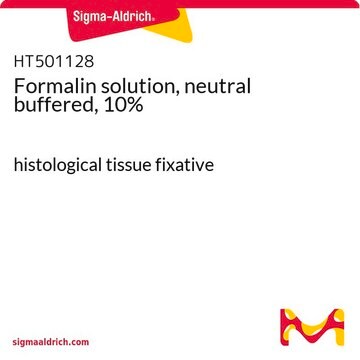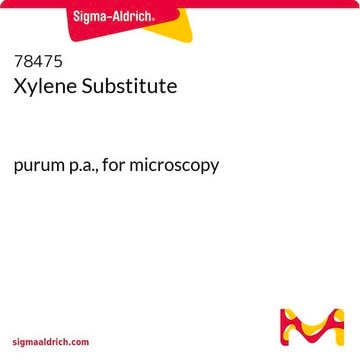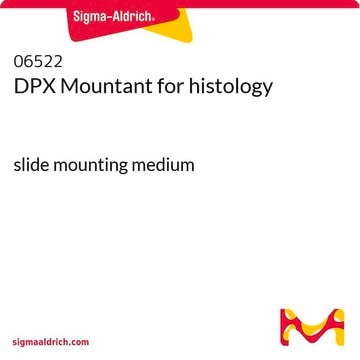534056
Xylenes
histological grade
Synonym(s):
Xylene mixture of isomers
About This Item
Recommended Products
grade
histological grade
Quality Level
vapor density
3.7 (vs air)
vapor pressure
18 mmHg ( 37.7 °C)
Assay
≥75.0% (xylenes isomers)
form
liquid
expl. lim.
7 %
impurities
≤0.05% (water)
≤25% ethylbenzene
evapn. residue
<0.002%
refractive index
n20/D 1.497 (lit.)
bp
137-140 °C (lit.)
mp
-34 °C
density
0.86 g/mL at 25 °C (lit.)
application(s)
histology
storage temp.
room temp
SMILES string
Cc1ccc(C)cc1.Cc2cccc(C)c2.Cc3ccccc3C
InChI
1S/3C8H10/c1-7-3-5-8(2)6-4-7;1-7-4-3-5-8(2)6-7;1-7-5-3-4-6-8(7)2/h3*3-6H,1-2H3
InChI key
MVZVDAGWAAZJPE-UHFFFAOYSA-N
Looking for similar products? Visit Product Comparison Guide
Related Categories
General description
Application
It can be used in:
- Cresyl violet staining.
- Fluoro-Jade B staining process.
- Giemsa cell staining protocols.
Packaging
500 mL in glass bottle
534056-4L , 4×4 L in glass bottle / 534056-4L-D in poly bottle
Signal Word
Danger
Hazard Statements
Precautionary Statements
Hazard Classifications
Acute Tox. 4 Dermal - Acute Tox. 4 Inhalation - Aquatic Chronic 3 - Asp. Tox. 1 - Eye Irrit. 2 - Flam. Liq. 3 - Skin Irrit. 2 - STOT RE 2 - STOT RE 2 Inhalation - STOT SE 3
Target Organs
Central nervous system,Liver,Kidney, hearing organs, Respiratory system
Storage Class Code
3 - Flammable liquids
WGK
WGK 2
Flash Point(F)
77.0 °F - closed cup
Flash Point(C)
25 °C - closed cup
Choose from one of the most recent versions:
Already Own This Product?
Find documentation for the products that you have recently purchased in the Document Library.
Customers Also Viewed
Related Content
Three-dimensional (3D) printing of biological tissue is rapidly becoming an integral part of tissue engineering.
Three-dimensional (3D) printing of biological tissue is rapidly becoming an integral part of tissue engineering.
Three-dimensional (3D) printing of biological tissue is rapidly becoming an integral part of tissue engineering.
Three-dimensional (3D) printing of biological tissue is rapidly becoming an integral part of tissue engineering.
Our team of scientists has experience in all areas of research including Life Science, Material Science, Chemical Synthesis, Chromatography, Analytical and many others.
Contact Technical Service











